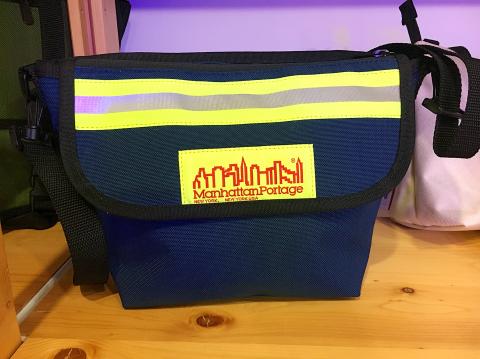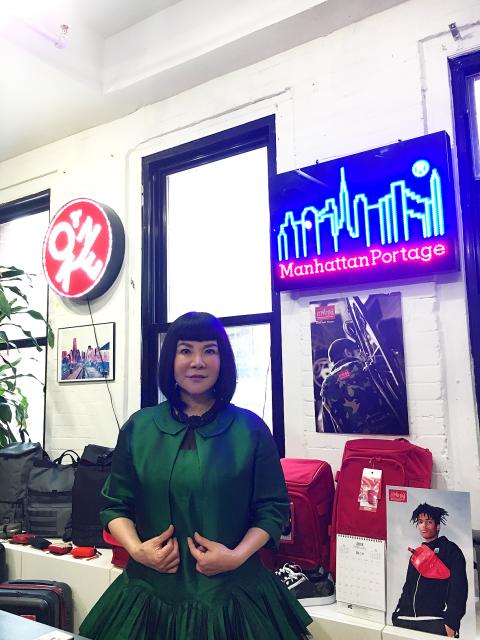During the 1980s, while Manhattan Portage was earning its street cred in the gritty Big Apple as the go-to bag for bicycle messengers, Lin Su-hwei (林淑惠) was thousands of miles away in Taiwan.
What Lin didn’t know at the time was that more than two decades later, she would own the trademark known for its bright red rectangle and image of the New York City skyline — a symbol emblazoned on Manhattan Portage goods sold worldwide, including in Taiwan.
The brand celebrates its 35th anniversary this year.

Photo: Chris Fuchs
“The art of business is not the money,” Lin, CEO of Portage World-Wide, said in a recent interview at the company’s headquarters in SoHo. “It’s kind of like you create something which does not exist and you make it exist. This is the beauty and happiness [of it].”
BORN TO DO BUSINESS
Lin is one of six children born into a family in Kaohsiung with a knack for business. Her parents owned and ran a pharmaceutical factory, manufacturing, distributing and importing medicine. They also had a store.

Photo: Chris Fuchs
Lin studied international business and tourism in college in Taiwan and traveled to Japan for graduate school. But it was a trip to New York City in the 1990s with US$3,000 in cash that really got things started.
“I decided to go outside the country to challenge myself,” Lin said.
At first, she worked for a friend who owned a design company called Token, which sold jewelry. Her English limited, Lin peddled the goods in Koreatown in Manhattan, offering buyers a better price by insisting they pay in cash only.
But eking out a living proved tough, Lin said, as some customers tried to take advantage of her being a newbie.
“Every night I cried.”
A phone call home set her straight. “My mother said, ‘Su-hwei, don’t think this way. Life is like a marathon, and if you don’t run until the end, you don’t know who the real winner is.’”
Then came a request from a Japanese friend — Lin was asked to help find a messenger bag.
Without the convenience of today’s Internet, Lin conducted her search the old-fashioned way, by stopping bicycle messengers on the streets of Manhattan. They, in turn, directed her to Manhattan Portage.
Lin ended up buying Token in 1996, using that company to export Manhattan Portage bags to Asia.
Through a mutual friend, Lin said she also got to meet the founder of Manhattan Portage in 1998, and the two became partners. Lin established Portage World-Wide to handle retail, wholesale and international sales, and opened a retail store that year in the East Village of Manhattan.
Lin worked virtually seven days a week for eight years, manning the counter and interacting with customers, despite what she said were her poor English skills. She recalled having to sometimes resort to body language to communicate.
OBSTACLES
There were other obstacles too. In the early 2000s, armed robbers targeted her shop. And in Japan, someone had already registered the Manhattan Portage trademark, thus preventing the bags from being sold in that country.
A plane trip to the American embassy in Tokyo and a lawsuit helped get the trademark returned in 2006.
That was also the same year Lin bought the Manhattan Portage trademark and became the sole shareholder of Portage World-Wide.
Lin has since closed the East Village shop, operating just one now on Elizabeth Street in Manhattan. The company also has a higher-end sister line called Token.
NEW ERA
One of the biggest differences today, Lin said, is that the Manhattan Portage label has more of a global presence than before, with goods sold in over 40 countries.
She also noted how digital consumerism has spurred change, as customers increasingly prefer to use the Internet for purchases. Portage World-Wide maintains a social media presence, such as on Facebook and Instagram, and features separate Web sites for China, Taiwan and Japan, among others.
Lin declined to discuss the company’s finances, including questions about sales revenue and volume. She did say its financials are very strong.
“I believe many people are watching this brand right now, so I don’t like to say anything,” Lin said, adding that she knows people want to buy her business.
“This company is like a baby for me.”
Portage World-Wide has around 25 employees and makes its bags in Taiwan. One custom at her headquarters is to have everyone sit down together for lunch. Conscious of just how expensive food can be in SoHo, Lin said sometimes she’ll cook for the gathering. (Recently she made a pasta dish with Italian sausage.) Other times, she’ll order out.
This bonding time helps build a strong team and break down barriers.
“When you have one chopstick, it’s very easy to break,” she said. “But when you have 10 chopsticks together, you cannot break them. This is the strength of teamwork.”

June 9 to June 15 A photo of two men riding trendy high-wheel Penny-Farthing bicycles past a Qing Dynasty gate aptly captures the essence of Taipei in 1897 — a newly colonized city on the cusp of great change. The Japanese began making significant modifications to the cityscape in 1899, tearing down Qing-era structures, widening boulevards and installing Western-style infrastructure and buildings. The photographer, Minosuke Imamura, only spent a year in Taiwan as a cartographer for the governor-general’s office, but he left behind a treasure trove of 130 images showing life at the onset of Japanese rule, spanning July 1897 to

One of the most important gripes that Taiwanese have about the Democratic Progressive Party (DPP) is that it has failed to deliver concretely on higher wages, housing prices and other bread-and-butter issues. The parallel complaint is that the DPP cares only about glamor issues, such as removing markers of Chinese Nationalist Party (KMT) colonialism by renaming them, or what the KMT codes as “de-Sinification.” Once again, as a critical election looms, the DPP is presenting evidence for that charge. The KMT was quick to jump on the recent proposal of the Ministry of the Interior (MOI) to rename roads that symbolize

On the evening of June 1, Control Yuan Secretary-General Lee Chun-yi (李俊俋) apologized and resigned in disgrace. His crime was instructing his driver to use a Control Yuan vehicle to transport his dog to a pet grooming salon. The Control Yuan is the government branch that investigates, audits and impeaches government officials for, among other things, misuse of government funds, so his misuse of a government vehicle was highly inappropriate. If this story were told to anyone living in the golden era of swaggering gangsters, flashy nouveau riche businessmen, and corrupt “black gold” politics of the 1980s and 1990s, they would have laughed.

In an interview posted online by United Daily News (UDN) on May 26, current Chinese Nationalist Party (KMT) Chairman Eric Chu (朱立倫) was asked about Taichung Mayor Lu Shiow-yen (盧秀燕) replacing him as party chair. Though not yet officially running, by the customs of Taiwan politics, Lu has been signalling she is both running for party chair and to be the party’s 2028 presidential candidate. She told an international media outlet that she was considering a run. She also gave a speech in Keelung on national priorities and foreign affairs. For details, see the May 23 edition of this column,